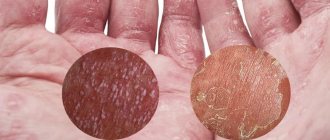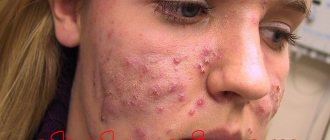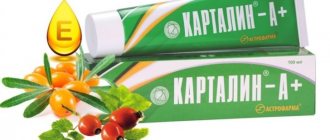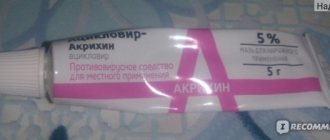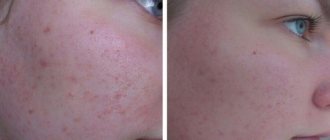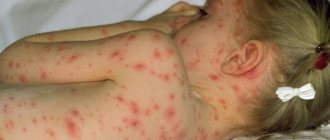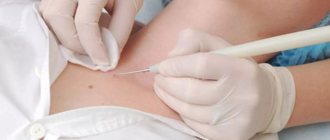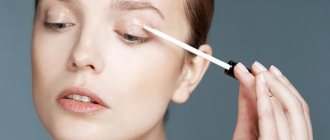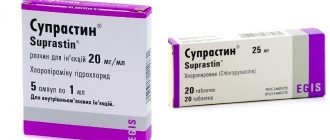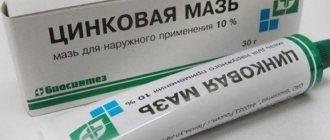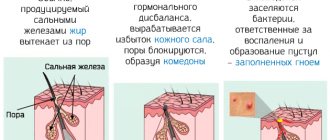Consequences of taking Roaccutane
Hello, dear doctor! Please tell me what is the specific time frame for complete removal of Roaccutane from the body. The fact is that I have been using this drug for about a month, and for three months since the last use I have been experiencing many persistent and unpleasant side effects: firstly, the rashes on my face have not stopped, and secondly, they have become even worse, - thirdly, there is constant mental stress, expressed in a persistent depressive state, mental activity is impaired, namely, it manifests itself much worse than before, memory and concentration have deteriorated significantly. I'm wondering when this will all stop and whether it will stop at all, will I get back into the old rut, and for how long? - Anastasia
2010
Dear Anastasia! Roaccutane can cause serious negative health effects, so before prescribing it is necessary to evaluate the balance of possible benefits and risks. The active ingredients of the drug Roaccutane are eliminated from the body within approximately 2 weeks, side effects may persist much longer. At the beginning of treatment with Roaccutane, acne may worsen and last for several weeks. Contact a psychotherapist to confirm and assess the severity of depression and prescribe adequate treatment for the psycho-emotional state that has arisen. Dermatologist Panarin O.V.
Is hemangioma a side effect of Roaccutane? Planning pregnancy after treatment with Roaccutane.
Hello, Dr. Panarin. I took Roaccutane for 2 months, there are improvements, but there is also a serious side effect - hemangioma in the ear area. Treatment had to be stopped. Could this drug cause this problem? And another question. I am 19 years old. What tests do I need to take to determine the presence of the drug in the body? I am concerned about the health of my child in the future, because there is a lot of talk about the birth of children with pathologies in people who took the drug. How long before I can safely plan to have a baby? Thank you very much in advance! - Natalia
2010
Dear Natalia! It is possible that Roaccutane contributed to the occurrence of hemangioma, but this side effect is not indicated in the instructions for medical use of the drug. It is completely safe to become pregnant 2 months after stopping taking Roaccutane. Tests to determine the presence and amount of active ingredients of Roaccutane in the body are not required. Dermatologist Panarin O.V.
Mechanism of action in the treatment of acne
So, what is Roaccutane? Roaccutane is an effective medicine that helps completely cure acne. The product is a stimulator of regeneration processes and helps restore the skin. The active component is a biologically active form of vitamin A. This type of vitamin can be produced in the human body, but only in small quantities.
Worth knowing: Roaccutane tablets are prescribed for the treatment of severe acne with the formation of scarring, ulcers, and pigmentation, when other medications have not given a positive effect.
Pharmacological action of the drug:
- Reducing the pathological activity of the sebaceous glands, suppressing the production of sebum, reducing the spread of pathogenic microorganisms in the ducts.
- Thinning of the stratum corneum of the dermis, as a result of which it is easier to remove sebaceous secretions to the surface of the skin. Thanks to this, it is possible to avoid the appearance of new rashes, since the degree of pore clogging is reduced.
- The product has anti-inflammatory and bacteriostatic effects, which allows you to stop the inflammatory process and prevent the proliferation of microbes.
- The drug Roaccutane restores the processes of cell growth and regeneration. This property helps prevent the formation of scar tissue, spots and other traces of acne.
Generally speaking, it is still unknown exactly how the drug helps get rid of acne. Medical experts attribute the positive effect to the effects of vitamin A. Despite the many beneficial properties of the drug Roaccutane is not a panacea in the treatment of acne.
Skipping in taking Roaccutane
Hello! I have been taking Roaccutane under the supervision of a doctor for almost 7 months, weighing 60 kg, dose 30 mg per day. During the intake process there were omissions: I didn’t take it at all for 3 days, and several times (I can’t say for sure, about 8 times) I missed 10 mg, i.e. in the morning 20 mg. I drank, and in the evening I didn’t drink 10 mg (it turned out to be 20 mg per day), but these omissions occurred at different times. Will this somehow affect the result (the result is excellent, I’m already finishing the treatment)? - Anna
2010
Dear Anna! I don’t think that missing a few days of treatment with Roaccutane will have any effect on the final result of the treatment. Dermatologist Panarin O.V.
Roaccutane: 3 questions
Hello. I have been taking Roaccutane for 1 month at a dosage of 30 mg/day (my weight is 60 kg) while simultaneously taking Vitamin E 400 mg/day and Yarina hormonal tablets. The doctor prescribed them to reduce the possible side effects of Roaccutane, and said that I would need to take it at this dosage for 4 months. The doctor diagnosed moderate UHD. Before Roaccutane, I was treated for 3 years with all possible methods - gels, lotions, ultraviolet irradiation of the blood, ozone therapy, etc. But nothing helped! Many doctors refused to treat me with it, explaining that Roaccutane has a very negative effect on the reproductive system and can cause ovarian tumors and dysfunction. I have several questions for you: 1. Is this true, and have there been such cases in your practice? 2. Do you consider this treatment regimen appropriate: Roaccutane with simultaneous administration of hormones + vit. E (in this dosage, and in general). 3. How much impact can this have on my liver, since I’m only 20 years old? Side effects include dry mucous membranes in the first 2 weeks, nausea (happened once a month), headache. I can say that after a month, improvements are observed, but very insignificant, what could this be due to? Fake drug? Thank you in advance! - Victoria
2010
Dear Victoria! I strongly doubt that ultraviolet irradiation of blood and ozone therapy are effective for acne, as you have seen from your own experience. 1. Roaccutane itself, as a derivative of vitamin A, has an antitumor effect; ovarian dysfunction is not included in the list of side effects. Roaccutane has a strong negative effect on the developing fetus, to which the active substances of the drug enter the mother’s bloodstream; they do not have a negative effect on the reproductive organs of women and men. When taking Roaccutane, you definitely need “double” contraception, including a condom, incl. and for the reason that it cannot be completely ruled out that Roaccutane, by acting on liver enzymes, can reduce the contraceptive effectiveness of COCs (the active ingredients of the drugs: isotretinoin and ethinyl estradiol, are mainly metabolized with the participation of cytochrome P450 3A4 and by aromatic hydroxylation). 2. It was previously assumed that vitamin E could reduce the side effects of Roaccutane, but relatively recently it was proven that this is not the case. When taking the drugs Yarina and Roaccutane together, side effects may increase, for example, dry skin. 3. If there are no liver diseases, the biochemical parameters of the liver are normal (regular tests), and you do not abuse alcohol while taking Roaccutane, then negative consequences for the liver are unlikely. Significant improvement from treatment with Roaccutane should be expected after 2 months. Dermatologist Panarin O.V.
Published in the journal: Aesthetic Medicine. Volume III. No. 1, 2004
M. Kurdina Doctor of Medical Sciences
Among modern methods of treating acne, systemic treatment with retinoids occupies a leading position. Over the quarter century that has passed since the advent of roaccutane (isotretinoin), considerable experience has been accumulated in its use for acne. Various monotherapy and combination treatment regimens have been studied and implemented, and large-scale comparative studies of their effectiveness have been conducted. A number of publications are devoted to the safety of therapy, side effects and possible interactions with other drugs. The need for this article arose in connection with the widespread opinion among practicing physicians, primarily dermatologists, about the high toxicity of isotretinoin.
This work is a review of current literature data, as well as the results of our own studies of the tolerability and safety of roaccutane.
1. Reactions from the skin and mucous membranes
The main side effects of treatment with Roaccutane on the skin primarily include dermatitis of the face and open areas of the body, the back surfaces of the hands and forearms. Many doctors mistakenly regard these symptoms as manifestations of an allergic reaction either to isotretinoin, or to any foods, medications and external agents that the patient used during treatment. Of course, toxicoderma to Roaccutane itself or to other medications or products while taking isotretinoin is possible, but in this case it will be accompanied by general phenomena and be of a generalized rather than localized (face, hands) nature. Simple contact or allergic dermatitis to cosmetics used during treatment, on the contrary, will be located only in one anatomical area, and the lesion will have clearer boundaries.
Another common mistake is the assessment of erythema and desquamation of the face and hands as manifestations of photosensitivity. In vitro phototoxicity studies of isotretinoin in a microbiological model with Candida albicans, as well as models of photohemolysis and human lymphocytes, gave negative results [1]. Most of the clinical cases of the development of photosensitivity described in the literature are not reliable, since it could be caused by other reasons, for example, taking minocycline simultaneously with roaccutane. The photosensitizing effect of isotretinoin is also refuted by the results of phototesting of patients receiving the drug. It has been shown [1] that the minimum erythemal doses of ultraviolet irradiation (UVR) do not decrease.
The doctors’ mistakes mentioned earlier are quite natural, since the instructions for using Roaccutane only list the side effects, but do not explain their essence. In fact, the development of erythema and desquamation of the face and hands is a consequence of hypervitaminosis A, one of the manifestations of which is retinoid dermatitis. In winter, its occurrence is influenced by frost and wind, and in summer by increased ultraviolet radiation, since roaccutane suppresses the excretion of sebum and changes the structure of the stratum corneum of the epidermis. The same reasons determine other reactions described in the literature on the part of the skin and mucous membranes to taking isotretinoin: dryness, peeling, itching. Violation of the hydro-lipid mantle leads to the appearance of cracks, inflammation (dermatitis, paronychia, xerophthalmia, conjunctivitis, cheilitis), secondary infections (pyogenic granuloma). A means of preventing them is a rational dosage of roaccutane, as well as the use of softening and moisturizing creams. In addition, for dry eyes, “artificial tears” are recommended, and for dry mouth, increased fluid intake.
2. Pregnancy
An extremely common medical error is determining the period of refusal of pregnancy after the end of treatment with Roaccutane. Doctors recommend that women not become pregnant for 2 years after stopping isotretinoin, confusing two systemic retinoids: roaccutane and tigazone (neotigazone).
To remove 99% of the drug from the body, a time equal to 7 half-lives is required. The half-life of isotretinoin ranges from 7 to 50 hours (on average 20 hours), therefore, 7 periods - a maximum of 350 hours, that is, 14.58 days. In other words, a woman can plan or maintain a pregnancy that occurs 15 days after finishing taking Roaccutane. For tigazone, the half-life is 100 days, 7 periods - 700 days, that is, 1.9 years. Therefore, a woman taking tigazone should not become pregnant for almost 2 years.
A well-known complication of roaccutane is teratogenicity. There is not a single article in the domestic literature devoted to this issue, so the data from an American 5-year study, which included 177,216 women taking isotretinoin, are interesting [2]. 402 of them became pregnant (3.4 cases per 1000 courses of Roaccutane) during treatment, despite doctors’ warnings about its inadmissibility. Medical abortions were performed on 72% of pregnant women, 16% had spontaneous miscarriages, 3% were operated on for ectopic pregnancy, 8% gave birth to 32 live children. Thirteen children were examined by a teratologist, and 5 of them had developmental defects consistent with isotretinoin embryopathy. Among the remaining children whose parents refused to be examined by a specialist, one was diagnosed with cerebral palsy, one died from malformations of the heart, kidneys, liver, ear, and eyes.
Thus, Roaccutane can be prescribed to women with a high, but not absolute, degree of safety, which cannot be achieved despite the existing comprehensive pregnancy prevention program developed by the manufacturer.
3. Hepatotoxicity
One of the common prejudices is the myth about the high hepatotoxicity of Roaccutane. However, increases in liver function tests are observed in less than 10% of patients taking isotretinoin, and these changes are dose-dependent and completely reversible [3]. Therefore, it was proposed to monitor liver function only before starting to take roaccutane, that is, if no pathology was initially detected, then it is not necessary to study liver tests during therapy [4].
Roaccutane rarely causes serious hepatotoxic reactions, being significantly inferior in the frequency of their development to non-steroidal anti-inflammatory drugs, antibiotics, anti-tuberculosis drugs, some neuro- and psychotropic drugs, anabolic and contraceptive steroids. In cases where liver damage does develop, it has the character of a metabolic idiosyncrasy. Therefore, it is impossible to predict the development of hepatotoxicity when treating a particular patient with retinoids. It follows from this that it is fundamentally impossible to prevent the development of such reactions. Moreover, the risk of developing hepatotoxic reactions increases with the simultaneous use of other drugs, especially hepatotropic ones. It is advisable to carry out routine treatment with retinoids with a minimum number of concomitant prescriptions. The use of so-called “liver protectors” - hepatoprotectors - is not only pointless, but also harmful. The less medications taken at the same time, the less likely it is to develop side effects, including hepatotoxic ones.
4. Lipid metabolism
Even 20 years ago, it was found that in 25% of patients receiving isotretinoin, the level of triglycerides in the blood serum increases, which in some cases is accompanied by an increase in the concentration of total cholesterol and low-density lipoproteins and a decrease in high-density lipoproteins [5]. This effect is dose-dependent and reversible. It develops during the first 4–6 weeks of taking the drug. Typically, triglyceride levels do not exceed 7–8 mmol/l, which does not manifest itself clinically. It can be higher than this value only in patients with initial hyperlipidemia receiving large doses of roaccutane.
It has been proven that a temporary imbalance of high- and low-density lipoproteins does not affect the risk of cardiovascular pathology in this group of patients [6].
The results of a ten-year (!) study were extremely important, during which it was found that in women taking both roaccutane and oral contraceptives, there is a statistically significant connection between taking the latter and hypertriglyceridemia and hypercholesterolemia [7]. At the same time, there is no correlation between taking roaccutane and increasing the concentration of triglycerides and cholesterol in the blood serum. In fact, all oral contraceptives contain progesterone, a contrainsular hormone, an increase in the level of which leads to hyperglycemia, dyslipidemia, changes in water and mineral balances (fluid retention, osteoporosis, hyperostosis, myalgia, etc.). Therefore, women taking Roaccutane are strongly discouraged from using oral contraception. It is possible to prevent pregnancy using any other methods: barrier, chemical, combined, IUD, etc.
5. Neuropsychiatric disorders
In recent years, a number of publications have appeared devoted to the study of the causal relationship between neurotic and mental disorders and isotretinoin therapy. In addition, large cohort studies have been conducted in the general acne population. Among the mental disorders studied, severe depression, agitated depression, anxiety, impaired concentration, memory impairment, irritability, aggression, sleep pathology, personality disorders and suicidal behavior.
It was found that between the ages of 12 and 20 years, in response to acne, 30–50% of acne patients develop psychological reactions. These disorders can range from mild anxiety to severe depression and suicide, and are accompanied by decreased self-esteem and self-confidence, and a feeling of social maladjustment [8, 9]. In the largest study of neuropsychiatric disorders in more than 8 thousand adolescents in Great Britain and Canada who suffered from acne, two groups of patients were compared: those treated with roaccutane and those treated with any other methods except roaccutane [10]. The results showed that isotretinoin does not increase the incidence of depression, anxiety, aggression, sleep pathology, suicide and other conditions listed above. Knowledge of the nature of acne, its prognosis and, especially, successful treatment reduces the level of mental disorders.
It is important for a practitioner to be able to recognize psychoneurological problems in patients with acne, for which it is advisable to use the following screening questions: “Have you felt constant sadness and melancholy, sometimes daily, over the past 2 weeks? Have you lost interest in your previous activities (work, hobbies), friends, family, pets?” etc. There is no need for special psychological questionnaires.
If psychoneurological disorders are suspected, it is necessary to consult the patient with a specialist of the appropriate profile before starting to take Roaccutane.
[…]
7. Conclusion
Based on everything said earlier, we can conclude that isotretinoin is a highly effective remedy for the treatment of acne. Unfortunately, many doctors consider it highly toxic without good reason.
The most serious complications of roaccutane therapy include teratogenicity, therefore contraception 2 weeks before, during and 2 weeks after treatment is required. It can be carried out by any method, with the exception of oral contraceptives. A woman can plan or maintain a pregnancy 15 days after stopping taking Roaccutane.
Roaccutane rarely causes serious hepatotoxic reactions . The latter, if they develop while taking isotretinoin, are of the nature of metabolic idiosyncrasy, so it is impossible to predict the development of hepatotoxicity when treating a particular patient with retinoids. It follows from this that it is fundamentally impossible to prevent the development of such reactions. The use of hepatoprotectors is not only pointless, but also harmful, since the risk of developing hepatotoxicity increases with the simultaneous use of other drugs, especially hepatotropic ones.
A means of preventing the most common, but least dangerous complications in the form of dry skin and mucous membranes, cheilitis, retinoid dermatitis is a rational dosage of roaccutane, as well as the use of emollient and moisturizing external agents.
The combination of roaccutane with progesterone preparations (oral contraceptives), vitamin A, ultraviolet radiation, aminoglycosides and tetracyclines is contraindicated. Treatment of acne with roaccutane, according to our data, is possible with the previously listed concomitant diseases (beyond exacerbation).
Literature
- Jeanmougin M. Sundamage-prevention by clothing/sunscreens. Ann Dermatol Venerol 2002;129:1S104.
- Mitchell AA, Van Bennekom CM, Louik C. A pregnancy-prevention program in women of childbearing age receiving Isotretinoin. New England J Medicine 1995;333(2):101-106.
- Roenigk HR. Liver toxicity in retinoid therapy. J Am Acad Dermatol 1988;19:199-208.
- Barth JH, Macdonald-Hull SP, Mark J et al. Isotretinoin therapy for acne vulgaris: a re-evaluation of the need for measurements of plasma lipids and liver function tests. Brit J Dermatol 1993;129(6):704-707.
- Shalita AR, Cunningham WJ, Leyden JJ et al. Isotretinoin treatment of acne and related disorders: an update. J Am Acad Dermatol 1983;9:629-638.
- Lestringant G, Frossard P, Agarwal M, Galadari I. Variations in lipid and lipoprotein levels during isotretinoin treatment for acne vulgaris with special emphasis on HDL-cholesterol. Int J Dermatology 1997;36(11):859.
- ChenY, Xue S, Dai W et al. Elevation plasma triglyceride and cholesterol levels during isotretinoin therapy both oral contraceptions. Pharmacoepidemiology and Drug Safety 1995;4:91.
- Jacobs DG, Deutsch NL, Brewer M. Suicide, depression, and isotretinoin: is there a causal link? J Am Acad Dermatol 2001;45(5):S168-175.
- Wysowski DK, Pitts M, Beitz J. An analysis of reports of depression and suicide in patients treated with isotretinoin. J Am Acad Dermatol 2001;45(4):515-519.
- Jick SS, Kremers HM, Vasilakis-Scaramozza C. Isotretinoin use and risk of depression, psychotic symptoms, suicide, and attempted suicide. Arch Dermatol 2000;136:1231–1236.
Taking Roaccutane without a dermatologist's prescription
Good afternoon Please tell me how effective Roaccutane is, and whether it is suitable for everyone. Can it be used without a doctor? – Maria
2009
Dear Maria! Roaccutane should be taken (and dispensed from pharmacies) only with a prescription from a dermatologist; self-medication is strictly not recommended. One of the indications for prescribing this drug is the ineffectiveness of adequate traditional therapy. Roaccutane is by far the most effective drug for treating acne, but taking it can lead to serious side effects. Dermatologist Panarin O.V.
Purpose of the drug
Roaccutane is used to eliminate severe types of skin rashes, namely:
- conglobate;
- nodular cystic;
- other types of rashes, which subsequently provoke the appearance of scars.
IMPORTANT! The drug is prescribed to a person only in cases where other methods of therapy do not bring any results.
For each patient suffering from severe acne, the regimen for using Roaccutane is selected individually. The product can only be used after a detailed examination and prescription by a dermatologist. Self-medication is strictly contraindicated.
Roaccutane
Dear Oleg Valerievich! I am 20 years old. Since adolescence, acne on the face, back and chest. I don't know what the severity is. Most likely average. I have terribly oily skin on my face. I used Skinoren - no effect. The doctors did not prescribe any examinations (hormones, gastrointestinal tract, etc.). The doctor prescribed me Roaccutane, but did not take any tests before starting the course. I just took my word for it that “I don’t seem to have chronic liver or kidney diseases.” Now I'm worried. I should now see a dermatologist in a month and have a blood test. I have been taking Roaccutane for the third day, one tablet twice a day. Weight 50 kg. Sorry if I'm wasting your time, but I'm very worried about the consequences. Please tell me, is this drug very harmful to the body? Can Roaccutane damage your liver? Unfortunately, our doctors are not very attentive to their patients. And also, is treatment with Roaccutane often ineffective? That is, the acne soon returns again or is not treated at all? And what about oily skin? Thank you in advance! - Olga
2009
Dear Olga! I believe that before prescribing Roaccutane in a standard dosage, it is necessary to undergo a biochemical blood test for liver enzymes and fats. In addition, women are also required to undergo a hCG test to exclude pregnancy. The drug relatively rarely causes serious side effects (for example, drug-induced hepatitis may occur). Treatment with Roaccutane is rarely ineffective, but it must be strictly justified (not prescribed to everyone) and carried out under regular clinical and laboratory control (examinations by a dermatologist, tests, etc.). Skin oiliness during treatment with Roaccutane is significantly reduced, after completion it gradually increases, but usually becomes slightly less than before therapy. Dermatologist Panarin O.V.
Roaccutane and reproductive health
Hello! Please tell me, I’ve been taking Roacutane for a long time, my periods have stopped, I was prescribed vitamins: folic acid, glutamic acid, methionine. When I drank, my period came, but now it doesn’t come again. What to do? I am very afraid, three years ago I had an abortion, after which I checked many times, everything seemed to be fine, but now I am even more afraid, I really want children. - Alexandra
2009
Dear Alexandra! Roaccutane does not affect menstruation or the female reproductive system in any way (all identified side effects are reflected in the latest version of the instructions for the drug). While taking Roaccutane and for one month after its end, you must constantly use 2 methods of contraception, one of which must be a condom, otherwise if pregnancy occurs during this period, there is a high probability of congenital deformities in the child. Dermatologist Panarin O.V.
How to use them?
All drugs for the systemic treatment of acne are used only as prescribed by a dermatologist. When using them, you must follow the following rules:
- Undergo the examination prescribed by your doctor before treatment
- When prescribing, ask in detail about the method of use and special precautions.
- Follow the dosage and frequency of use prescribed by your doctor.
- Carefully read the leaflet of the drug and follow its instructions
- Do not stop treatment or change dosage without consulting your doctor.
- Visit your doctor regularly and take all necessary tests
- Report all side effects and complications to your doctor immediately
The development of serious side effects may serve as a reason to discontinue the drug or change its dose - but only a doctor can do this. All of these drugs cannot be used during pregnancy and lactation. Do not give the medications prescribed to you for self-treatment of acne to anyone - most likely, this will only harm the other person.
Please do not try to use these medications on your own.
Roaccutane and pustular diseases
Hello, dear Oleg Valerievich. Please tell me, is it possible to develop hidradenitis and panaritium while taking Roaccutane? I’ve never suffered from either one or the other, but now, when I’ve already taken almost two-thirds of the cumulative dose of Roa, I’m exhausted with hidradenitis and panaritium.. – Anna
2009
Dear Anna! Yes, the listed side effects are possible during treatment with Roaccutane, because this drug is unsafe. Before prescribing Roaccutane, a dermatologist must carefully assess the balance of possible benefits and risks. It is necessary to prescribe antibacterial therapy to treat the complications that have arisen (withdrawal of Roaccutane will not lead to their disappearance). Dermatologist Panarin O.V.
Contraindications
Contraindications for taking Roaccutane are::
- pregnancy and breastfeeding,
- kidney failure,
- hypersensitivity to the drug or individual components in its composition,
- excess vitamin A,
- severe hyperlipidemia,
- simultaneous use with drugs from the tetracycline group,
- age up to 12 years.
Roaccutane is prescribed with caution for diabetes mellitus, alcoholism, lipid metabolism disorders, obesity and a tendency to depression.
Roaccutane dosage and vitamin A
Dear doctor, I’m going to take Roaccutane, my acne severity is moderate, my weight is 53 kg. The dermatologist prescribed a dose of 50 mg per day (2 tablets of 10 mg in the morning and 3 in the evening) + vitamin A. Is this a large dosage for my weight and is it possible to take vitamin A together with Roaccutane? Thanks for the answer! – Asya
2009
Dear Asya! In my opinion, the maximum permissible dosage of isotretinoin for oral administration for moderate severity is 0.5 mg/kg/day (at high dosages, the risk and severity of side effects may significantly exceed the expected benefit). When taking 50 mg/day, it is economically feasible to buy one standard 10 mg capsule and two standard 20 mg capsules of Roaccutane. Vitamin A can be taken while taking Roaccutane, but only in doses not exceeding physiological norms. Dermatologist Panarin O.V.
Composition and release form
The drug can influence the functionality of the sebaceous glands of the skin, as a result of which their pathological activity is leveled. The drug belongs to the pharmacological group of retinoids and is used in dermatological practice for the treatment of acne.
Dosage form: capsules for oral use. They are oblong in appearance, brown-red in color, and have a smooth surface. The active component is isotretinoin, a type of retinol. Capsules are produced in several dosages - 10 and 20 mg of the active ingredient in the composition.
The description of the drug indicates excipients in the composition:
- Soybean extract;
- Mannitol;
- Sorbitol;
- Potato starch;
- Iron oxide (red);
- Beeswax;
- Titanium dioxide
Capsules are packaged in a blister. The medicine is sold in 30 and 100 pieces. The price is determined by the number of capsules in the package.
Roaccutane and the sun
Hello, please tell me what will happen if I immediately go to the sea after finishing taking Roaccutane (after 5.5 months)? Is it possible to sunbathe in this case? – Diana
2009
Dear Diana! I recommend using sunscreen. While taking Roaccutane and for some time after its completion, increased sensitivity of the skin to sunlight is possible - inflammation of the skin occurs. Roaccutane significantly increases the likelihood of scarring after sunburn. Dermatologist Panarin O.V.
How do acne appear?
Inside each pore there is a gland that secretes sebum. Its main task is to protect the skin from adverse environmental influences. Unfortunately, pores are a fertile environment for the development of bacteria. That is, if the gland becomes more active and begins to secrete a lot of sebum, then the pores begin to become clogged and microbes quickly multiply in them. Additionally, everything is aggravated by dead particles of the stratum corneum.
Next, the body’s defense mechanism is activated, namely the release of leukocytes to fight bacteria. Consequently, in such places redness and swelling appear, which every person has encountered in his life. Against the background of overactive sebaceous glands and the entry of harmful microorganisms into the pores, the occurrence of severe acne is provoked.
A few questions about Roaccutane
Hello! The dermatologist prescribed me Roaccutane. He said that it should be taken after menstruation, why is that so? I just have to wait half a month, but I already want to start the course of treatment sooner. Is only a biochemical blood test enough to prescribe Roaccutane??? I also heard that Roaccutane is often counterfeited in Russia, and that it is better to use medicines from other countries, is this true? Thank you in advance! – Evgenia
2009
Dear Evgeniya! Treatment with Roaccutane begins on the 2-3rd day of the next normal menstrual cycle in order to be completely sure that there really is no pregnancy (pregnancy tests may be false negative). A biochemical blood test before prescribing Roaccutane and periodically during the course of treatment is prescribed to all patients; the possibility of performing other tests is considered individually at the appointment. I have no information about counterfeits of Roaccutane. Dermatologist Panarin O.V.
When do the first positive changes occur?
Before starting treatment, many people become curious, when does improvement occur? It’s worth saying right away that you shouldn’t expect a miracle from the first pill. Moreover, usually the course of therapy is quite long and its duration is determined by the doctor depending on the complexity of the disease and the physiological characteristics of the patient.
However, the first positive results can be observed after the first month of using Roaccutane. Of course, the drug acts rather slowly, but after a full course of therapy, a person completely gets rid of acne.
Compatibility of Roaccutane with alcohol
Hello, please tell me what is the danger of taking the drug Roaccutane together with drinking strong alcoholic drinks? Can taking Roaccutane cause infertility in a man? - Irina
2009
Dear Irina! Roaccutane may have a toxic effect on the liver (rarely drug-induced hepatitis occurs). If Roaccutane and alcohol are taken together, this may increase the toxic effect on the liver. In addition, both Roaccutane and alcohol can significantly increase the level of fats (triglycerides) in the blood, which can lead to inflammation of the pancreas (pancreatitis), which in some cases is life-threatening. Roaccutane does not have a negative effect on the reproductive organs of women and men; infertility does not occur from the use of this drug. Dermatologist Panarin O.V.
Interaction with other drugs
When using Roaccutane, you need to be as careful as possible when taking other medications. For example, the interaction of isotretinoin with tetracycline antibiotics significantly reduces the effectiveness of treatment.
Diuretics of the sulfamide and thiazide group increase sensitivity to ultraviolet rays, resulting in a risk of getting burns even after a short stay in the sun. Tetracyclines are completely contraindicated in combination with the drug, since this can lead to intracranial pressure.
In addition, under no circumstances should you “mix” Roaccutane with other medications that treat acne, pimples and papules, such as Retinol, Tretinoin, Tazarotene, etc. Such a combination can lead to the development of hypervitaminosis A.
